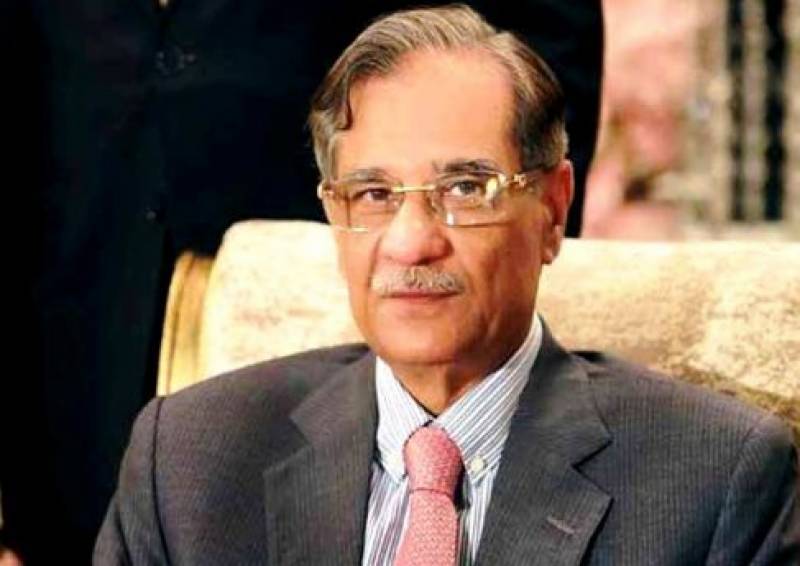Islamabad (Staff Report/Agencies): Chief Justice of Pakistan Mian Saqib Nisar on Thursday remarked that how the court could punish someone if the charges against them could not be proven.
“We are ready to sacrifice our lives for Prophet Muhammad (PBUH) but how can the court punish someone if there is no proof against them,” the CJP remarked while hearing the federal government’s plea regarding the appointment of a new Islamabad inspector general of police (IGP) in light of the current security situation across the country following the top court’s verdict acquitting Asia Bibi, a Christian woman sentenced to death over blasphemy allegations.
Referring to the 56-page judgment on Asia Bibi case, Justice Nisar said, "We started the judgment with the Kalma and constantly referred to the Holy Quran."
The top judge further said, “Blasphemy is not acceptable to anyone. No one’s faith is any less and we do not love the Prophet (PBUH) any less than anyone else but we are not the qazis of Muslims.”
Prime Minister Imran Khan, while addressing to the nation on Wednesday, fully backed the Supreme Court's verdict in Asia Bibi case, saying whoever is found involved in bringing the life at a standstill will be dealt with as per the law of the land.
He criticised the language used by a "small segment" in reaction to the verdict.
"The kind of language used today — that the judges are wajib-ul-qatl... and the narrative that there should be opposition against the judiciary... It is my belief that the principles on which Pakistan was founded, if they are not adhered to Pakistan has no future."
“Our faith as a Muslim is incomplete without our faith and love for the Holy Prophet (PBUH),” PM Imran said.
“I also appeal to the masses to not hear to such people or elements, and stay calm and peaceful.”
Earlier the day, top court acquitted Asia Bibi, a Christian woman sentenced to death over blasphemy allegations, and ordered her immediate release.
A three-member special bench of the SC headed by Chief Justice of Pakistan Justice Mian Saqib Nisar and comprising Justice Asif Saeed Khosa and Justice Mazhar Alam Khan Miankhel heard Bibi's 2014 appeal against her conviction and death sentence under section 295-C of the Pakistan Penal Code (PPC).
The bench ordered to immediately release Asia if there is no anymore case against her. She had been imprisoned for past nine years. The 56-page detailed judgement was authored by Chief Justice Mian Saqib Nisar and included a concurrent opinion by Justice Asif Saeed Khosa.
The judgement says "It is a well settled principle of law that one who makes an assertion has to prove it. Thus, the onus rests on the prosecution to prove guilt of the accused beyond reasonable doubt throughout the trial," noted the top judge in the order. "Presumption of innocence remains throughout the case until such time the prosecution on the evidence satisfies the court beyond reasonable doubt that the accused is guilty of the offence alleged against him.
"[...] The expression 'proof beyond reasonable doubt' is of fundamental importance to the criminal justice: it is one of the principles which seeks to ensure that no innocent person is convicted.
"Keeping in mind the evidence produced by the prosecution against the alleged blasphemy committed by the appellant, the prosecution has categorically failed to prove its case beyond reasonable doubt," concluded the chief justice.
On October 8, a three-judge special bench headed by Chief Justice Mian Saqib Nisar, and comprising Justice Asif Saeed Khosa and Justice Mazhar Alam Khan Miankhel reserved the verdict after hearing the arguments placed by litigants’ counsels.
During course of proceedings, Asia Bibi’s lawyer Saiful Mulook pleaded that the incident took place on June 14, 2009 and the case was registered on June 19 by an ‘Imam’ in Katanwala village who alleged that Bibi had confessed to committing blasphemy.
Mulook further informed the bench that the Imam (prayer leader) himself was not a witness to the incident.
He said that there were contradictions regarding how the notice of the incident was taken moreover permission was not taken from the district coordination officer (DCO) or the district police officer (DPO) to register the FIR, Mulook added.
Justice Nisar said as per the Imam’s statement, a panchayat was held in a five marla house and 1,000 people had gathered for it, moreover prayer leader said that the villagers had not attempted to beat up Bibi, the CJ added.
‘Bibi was a Christian preacher’, the CJ asked the counsel. To this Mulook responded in negative and said, ‘She was never a preacher.’
‘From your statements we have gathered that the Imam himself did not witness the incident as it happened and no blasphemous words were said in his presence.’ Justice Khosa remarked. The bench then reserved the verdict.
This is pertinent to mention that a trial court convicted Bibi for blasphemy in November 2010 and sentenced her to death. The Lahore High Court (LHC) had upheld her conviction and confirmed her death sentence in October 2014.
Asia Bibi then challenged the LHC verdict in the Supreme Court, which stayed her execution in July 2015 and admitted her appeal for hearing.
The SC had first taken up the appeal in October 2016, but had to adjourn the matter without hearing after one of the judges recused himself from the bench. The special bench resumed the hearing after two years and the appeal was heard earlier this month. The bench lead by CJP Justice Saqib Nisar had reserved the verdict.
Countrywide protest erupted in the wake of acquittal of Aasia Bibi.


